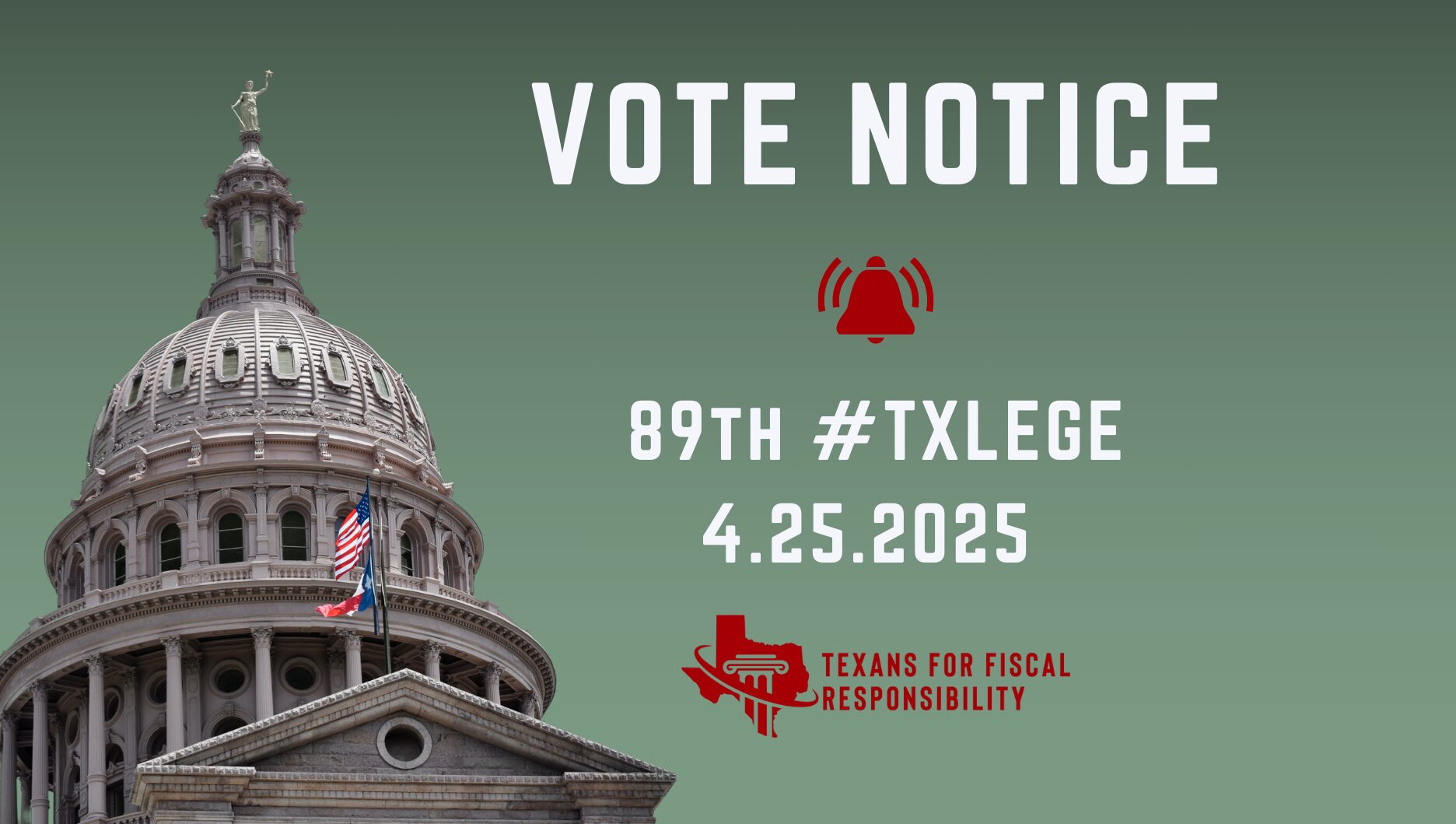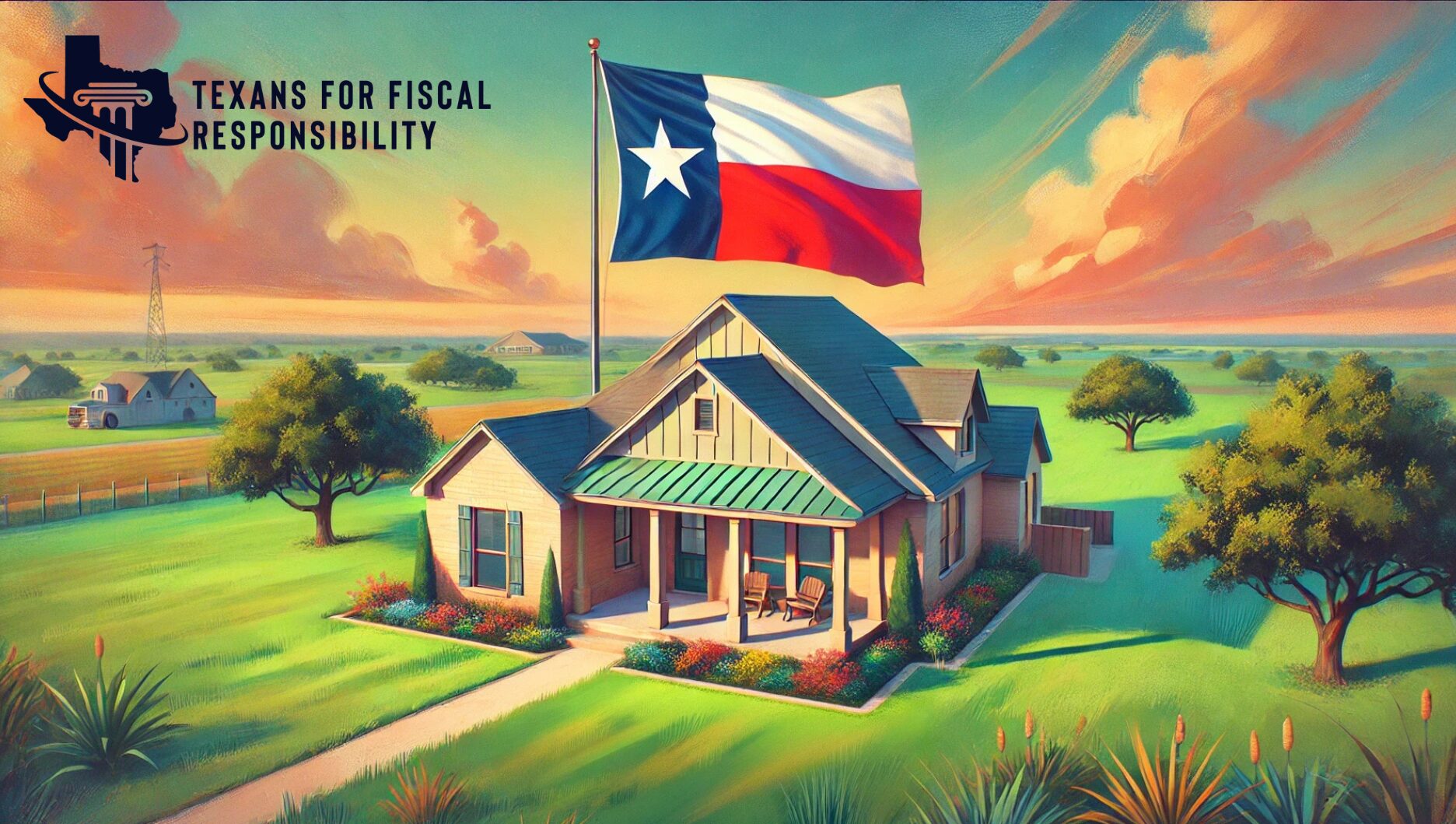
Texans for Fiscal Responsibility has issued the following vote notice for April 25th, 2025
Texas House of Representatives
Subject: House Bill 205 (HB 205) – Subsidizes exclusive fueling stations
- Author: State Rep. Philip Cortez (D-San Antonio)
- Caption: Relating to the eligibility for grants for alternative fueling facilities.
- TFR Position: OPPOSE
- Background:
- HB 205 creates a loophole in Texas law by allowing large transit authorities to receive state-funded grants for alternative fueling stations without offering public access to those stations. While the intention is to support cleaner transit options, the bill undermines the core accountability measure requiring taxpayer-funded infrastructure to serve the public. This sets a troubling precedent where select government entities can secure exclusive benefits with no reciprocal service to taxpayers. It effectively allows taxpayer dollars to subsidize private fueling infrastructure for government agencies. From a limited government viewpoint, this erodes transparency and efficient use of funds. The bill also prioritizes politically favored entities over more inclusive grant applicants, reducing competition and public benefit.
Subject: House Bill 499 (HB 499) – Mandates mental health warnings online
- Author: State Rep. Mary González (D-San Elizario)
- Caption: Relating to a warning label on social media platforms concerning the association between a minor’s social media usage and significant mental health issues.
- TFR Position: OPPOSE
- Background:
- HB 499 would force social media platforms to show a mental health warning every time a user opens their app, highlighting the risks for minors and requiring user acknowledgment before access. While the bill seeks to raise awareness of youth mental health challenges—a legitimate concern—it imposes a sweeping and burdensome mandate on private companies. It requires platforms to essentially function as mental health messengers and gatekeepers, potentially paving the way for further government overreach into private enterprise and online speech. The legislation also assumes a one-size-fits-all model by making these requirements universal, without distinguishing between adult and minor users. Furthermore, it delegates significant rulemaking authority to a state agency, giving unelected bureaucrats the power to determine the content and format of these warnings. This expands government regulation and creates unnecessary compliance costs. Instead of promoting parental responsibility, this bill shifts that burden to tech platforms.
Subject: House Bill 1722 (HB 1722) – Protects property access rights
- Author: State Rep. Carl Tepper (R-Lubbock)
- Caption: Relating to an owner’s or lessee’s access to property through a Texas Department of Transportation highway right-of-way.
- TFR Position: SUPPORT
- Background:
- HB 1722 protects landowners and tenants by ensuring they retain access to their property when TxDOT takes over control of nearby roadways. It prevents the state from retroactively applying new access restrictions to properties that were already legally accessible and developed. This protects investments in infrastructure like utilities, signs, or farm roads that may rely on such access. The bill defends property rights and helps avoid unnecessary costs to private individuals and businesses. It limits government overreach by making sure bureaucratic rule changes don’t result in surprise restrictions or forced spending (like building new driveways). The bill allows TxDOT to acquire land only through legal and established processes, not by regulatory backdoor. This is a pro-taxpayer measure that reduces government interference in long-established land use and avoids arbitrary red tape.
Subject: House Bill 879 (HB 879) – Military medical fast-tracked licensure
- Author: State Rep. James Frank (R-Wichita Falls)
- Caption: Relating to the licensing of certain military veterans as health care providers.
- TFR Position: SUPPORT
- Background:
- HB 879 provides a streamlined process for recently retired military doctors and nurses to become licensed to practice in Texas. To qualify, applicants must have been stationed in Texas at the time of separation, treated military members or veterans, and already hold a medical or nursing license in good standing from another state. They must also pass Texas’ jurisprudence exam. The bill excludes those with a dishonorable discharge, past or ongoing disciplinary issues, or relevant criminal records. It promotes efficient credentialing without expanding bureaucracy or relaxing core standards.
Subject: House Bill 1640 (HB 1640) – Solar Consumer Transparency Guide
- Author: State Rep. Gary VanDeaver (R-New Boston)
- Caption: Relating to a customer guide to home solar energy devices.
- TFR Position: SUPPORT
- Background:
- HB 1640 promotes consumer protection by ensuring Texans have clear, accurate information before investing in rooftop solar systems—often high-cost, long-term commitments. Rather than imposing new strict regulations or mandates, the bill empowers homeowners through transparency and informed choice, helping them avoid financial pitfalls, especially in predatory or misleading sales scenarios. By directing the Public Utility Commission to provide a standardized guide, the bill ensures consistent, market-neutral education while preserving competition and innovation in the solar industry.
Subject: House Bill 1276 (HB 1276) –New plant disease study
- Author: State Rep. Mary González (D-San Elizario)
- Caption: Relating to a study of this state’s response to plant disease or pest outbreaks.
- TFR Position: OPPOSE
- Background:
- HB 1276 mandates a new government study on plant diseases and pests, tasking Texas A&M AgriLife Extension Service with evaluating current state response efforts. While improving agricultural resilience is worthwhile, this bill adds another layer of bureaucracy without guarantees of implementation or measurable outcomes. Rather than funding another taxpayer-financed report, the Legislature should focus on streamlining existing agency coordination or leveraging private-sector expertise already working in this area. The bill creates a temporary program that requires new administrative work and reporting with no clear cost controls or spending cap. It places no limits on how much time or money may be used for the study. From a limited government standpoint, this is another example of reactive policymaking through study commissions instead of accountable action. Taxpayers should not bear the burden of open-ended research projects that may lead nowhere, when private sector initiatives should take the lead.
Subject: House Bill 1585 (HB 1585) – Housing Finance Corporations
- Author: State Rep. Cecil Bell Jr (R-Magnolia)
- Caption: Relating to housing finance corporations and to the location of residential developments owned by those corporations.
- TFR Position: NEUTRAL / AMEND
- Background:
- TFR has some serious concerns about HB 1585, some which were documented previously here and here. HB 1585 presents itself as a reform bill aimed at limiting the geographic scope of Housing Finance Corporations (HFCs), which have long operated beyond their original jurisdictions while benefiting from extreme property tax exemptions. The bill would restrict new HFC developments from claiming tax breaks unless they are physically located within the city or county that created the HFC. While this may be a small step toward accountability, the bill notably grandfathers in all existing projects—protecting current beneficiaries from scrutiny or reform. This raises red flags, especially as politically connected developers have used HFCs to secure long-term exemptions at the expense of local taxpayers and public services. The bill does little to address deeper structural issues like transparency, oversight, or the excessive tax exemptions for private developers of HFCs, that shifts hundreds of millions of dollars of tax burden onto other taxpayers. From a fiscally conservative perspective, the bill is a half-measure (at best)—acknowledging a problem without truly fixing it. Lawmakers should push for much broader, stronger reforms. HB 1585 risks becoming political cover rather than meaningful reform, and taxpayers deserve stronger protections from cronyism and hidden subsidies.
Subject: House Bill 2742 (HB 2742) – Fairer tax bill payment deadlines
- Author: State Rep. Cody Vasut (R-Angleton)
- Caption: Relating to the split-payment of ad valorem taxes.
- TFR Position: SUPPORT
- Background:
- HB 2742 provides relief to property owners by extending the deadline to make partial tax payments when tax bills are mailed late. Under current law, taxpayers must pay half their taxes by December 1, even if they receive the bill just days or hours before that deadline. This bill corrects that unfair scenario by adjusting the due date based on when the bill is actually sent. It ensures that taxpayers are not penalized due to government delays and mailing inefficiencies. The measure does not mandate new spending or create bureaucratic growth—it simply applies fairness within the existing tax collection framework. It also maintains taxpayer rights to protest appraisals and appeals under the new timeline. This promotes transparency and predictability for both taxpayers and local governments. HB 2742 is a commonsense improvement that supports fiscal responsibility without expanding government.
Subject: House Bill 1695 (HB 1695) – Protects signage property rights
- Author: State Rep. Terry Canales (D-Edinburg)
- Caption: Relating to the relocation, adjustment, and ownership of commercial signs.
- TFR Position: SUPPORT
- Background:
- HB 1695 helps private property owners protect their investments by allowing commercial sign owners to relocate signs displaced by government infrastructure projects. It ensures that cities cannot arbitrarily block these relocations, reducing costly eminent domain disputes. By making relocation a right under clear legal guidelines, the bill promotes predictability and fairness in dealings with state and local governments. It also safeguards the rights of business owners whose lawfully placed signs become nonconforming due to rule changes. It aligns with limited government principles by reinforcing private property rights and minimizing taxpayer burden.
Texas Senate
NONE
Reminder: Vote Notices are provided to both Texas state lawmakers and the general public, sharing Texans for Fiscal Responsibility’s position on issues to be rated as a part of the Fiscal Responsibility Index. Notices are provided prior to votes being taken in each legislative chamber.
Disclaimer: We reserve the right to consider amendments to legislation that may be introduced without notice as a part of issues to be rated on the Fiscal Responsibility Index. We will make every effort to provide notice on amendments that are pre-filed.




